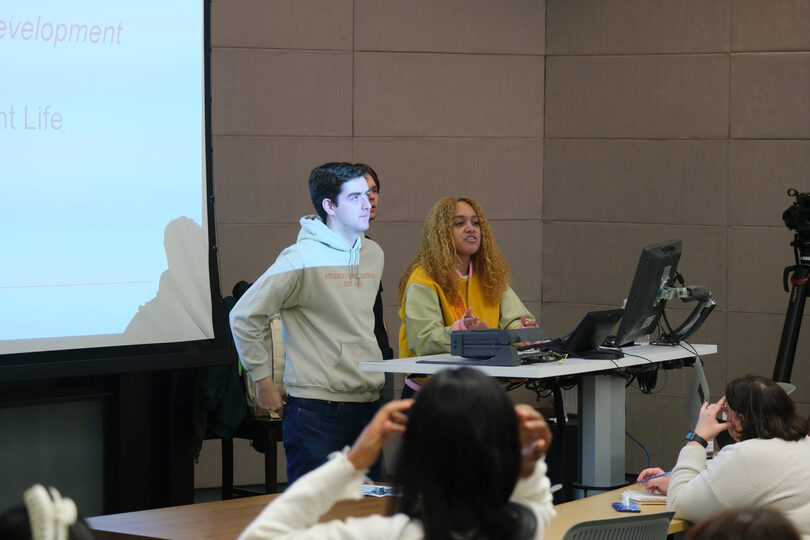Student Association advocates for expanded excused absence policy

Student Association President David Bruen and Vice President Adia Santos are in the process of writing the University Senate resolution to expand Syracuse University’s excused absence policy. Maxine Brackbill | Asst. Photo Editor
Get the latest Syracuse news delivered right to your inbox.
Subscribe to our newsletter here.
At last week’s Student Association meeting, SA President David Bruen and Vice President Adia Santos announced they’re working to develop new language for Syracuse University’s excused absence policy.
SU’s current excused absence policy doesn’t consider mental health to be a valid reason for an excused absence, and only allows a limited number per course. Bruen and Santos said their efforts to expand the policy would help better accommodate students’ mental wellness.
According to SU’s Office of Academic Affairs’ website, SU expects attendance in all courses, noting that it is a federal requirement for faculty to “promptly notify” the university if a student does not attend or ceases to attend any class.
Currently, the Barnes Center at The Arch does not provide medical excuse notes for students, but rather coordinates with Student Outreach and Support – formerly Student Outreach and Retention, or SOaR – management to notify instructors through the Orange Success platform, according to its website.
SOS lists three categories of absences: extended absences of 48 hours or more, absences — fewer than 48 hours — and emergency absences. Extended absences require documentation with SOS to notify faculty via Orange Success, while absences fewer than 48 hours are set up to be discussed directly with faculty. Emergency absences resulting in an extended absence are handled by SOS, which would at that point contact a student’s home college.
Absence notifications are prepared only for emergency and critical situations. OAA includes illness, injury, hospitalization, familial death and alleged victim of a crime as examples of these situations.
But these notifications do not excuse the absences. It is purely up to the faculty’s discretion and specific syllabus policies to excuse the absences, according to the OAA website.
At a November meeting, Santos said the usual limits of one to three excused absence per course each semester is not realistic or sustainable.
“That’s really just not enough to sustain yourself as a human being,” Santos said during the November meeting. “Everyone encourages you to separate your personal life from your academics, but that’s not really possible when you’re a human being.”
Santos initially met with Mary Grace Almandrez, SU’s vice president of diversity and inclusion, and Marcelle Haddix, associate provost for strategic initiatives, to discuss an expansion of excused absences. Her goal was to expand absences to include provisions for mental health, racial fatigue, imposter syndrome and first-year adjustments.
After Almandrez and Haddix supported Santos’s policy, Bruen and Santos presented the idea to Chancellor Kent Syverud. Santos said the plan was “really well received” by Syverud and his team.
“We’ve moved in the direction of trying to come up with a resolution for University Senate to implore faculty and staff to use better language to allow for more productive and serious classes,” Santos said.
SA has prioritized mental health in many of its initiatives. In October, SA partnered with the Barnes Center to host its 8th annual Mental Health Awareness Week, during which SA hosted daily events to highlight SU’s on-campus mental health resources. On Monday, SA’s Vice President of University Affairs Yasmin Nayrouz announced that the Barnes Center is working to improve counseling availability for students.
Santos and Bruen are currently in the process of writing the University Senate resolution to expand the excused absence policy with better language to accommodate students’ needs. Santos said on Monday that the process is moving in a positive direction.
“I actually see that coming to fruition this semester, which is really possible,” Santos said.





